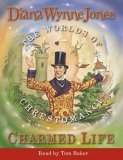 Libriomancer
Libriomancer by
Jim C. Hines My rating:
4 of 5 stars A high four stars for this one, approaching the elusive five.
I've been aware of Libriomancer for a while, but I've only recently got round to reading it. First it wasn't available in an ebook edition (at least, not where I live), and then the ebook price was excessive. Now that it's come down to more reasonable levels, I decided to pick it up and compare and contrast with [b:Celebromancy|16595339|Celebromancy (Ree Reyes #2)|Michael R. Underwood|https://d202m5krfqbpi5.cloudfront.net/books/1370460384s/16595339.jpg|22798602], which I just read. In short, I enjoyed Libriomancer a great deal more, thanks to stronger characters, better editing, more attention to detail, and even a more exciting story (which was the strongest aspect of Celebromancy for me).
The forms of the two titles tell you something. Celebromancy is about a phenomenon. It's based around an idea, a premise: "What if some celebrities got magical power from their fans?" It's the sequel to Geekomancy, where the premise is "what if some geeks could get magical power from pop culture?"
The premise of Libriomancer at first seems similar: "What if some people could access books and magically draw out useful items from them, because of the collective love and belief of the people who read the books?" However, as the title hints, it's about the character (the libriomancer) more than it's about the phenomenon. The premise really is, "What would it be like to be a person who could do that?" (And the answer is, "Incredibly cool!")
Libriomancer is told in first person, where Celebromancy (except for one of its many errors) is in third, and this further helped my identification with the character. Although both books have strong plots, and the characters in Celebromancy aren't terrible, Libriomancer's characters (including the non-first-person ones) had more depth, and it felt like a character-driven book. I certainly came to care more about the characters in Libriomancer.
Another factor which had a strong influence on my enjoyment was the first-draft feel that I discussed in depth in my review of Celebromancy, compared with the finished, polished feel of Libriomancer. It's true that I read an advance reader copy of Celebromancy, but I know from looking at the Amazon sample that some egregious errors persist in the published version, and there were a great many of them (about 90) in the version I read - not only typos and homonyms, but scenes that didn't fit together well, continuity errors and inconsistencies. In Libriomancer, I found only two or three issues, all minor. One character is inconsistently spelled as DeGeorge in some places and De-George in others; a character says "less frontal development that I should have expected", with "that" substituted for "than"; and I'm not even sure that the use of the word "excised" instead of "exorcised" was an error, since it does still make sense (though "exorcised" would be the more usual word to use for removing a spirit). That's it.
Now, it would be possible to carp about some of the details of the plot. It's cinematic, but it's urban fantasy; why shouldn't it be cinematic and over-the-top? The author clearly loves adventurous sci-fi and fantasy, and it's very much in that vein, with plenty of fights, explosions, vampires, magic, exotic weaponry, detective work, loved ones at risk, the fate of the world in question, a crazy, dangerous antagonist, everything you could want in an urban fantasy adventure (except possibly werewolves, though there are chupacabras if you must have something dog-shaped and dangerous). I enjoyed it for what it is, able to immerse myself in the fiction because it wasn't full of distracting errors that kept pulling me out of the story.
Because the author is so well-known as a feminist ally and anti-sexist activist, I feel I should discuss that aspect a little. The main character is male, but he's backed up by a female character who functions as the muscle (she's a supernatural, and stronger than him). She's actually from a book (a book which exists in the world of Libriomancer, though not in ours), an adolescent fantasy in which the women are both physically strong and also completely submissive to their lovers. Her (female) lover has been captured and is being held effectively hostage by vampires, and she transfers at least part of her allegiance to the protagonist for complicated reasons. The protagonist is attracted to her, but as a decent man is uncomfortable with the fact that her nature makes her want whatever her lover wants, thus providing a secondary tension while they run around trying to solve the main plot problems.
I thought the character relationships, and sexual politics, were handled well and creatively, even if the resolution for the situation is odd and fraught with problems (something which isn't at all glossed over). The author also does a good job of making the woman's hostage lover into a character, not just a Woman In a Refrigerator, by giving her an existing (professional) relationship with the main character, a scene around the middle in which she has lines and an agenda, and another such scene at the end.
Overall, I thoroughly enjoyed this book, and although I won't be breaking my self-imposed price ceiling and paying $9.99 for the sequel, I will be watching for it to come down to a reasonable level and then jumping on it with glee. (Unfortunately, I can't get it to add to my tracker on ereaderiq, so I'll just have to check periodically.)
View all my reviews





